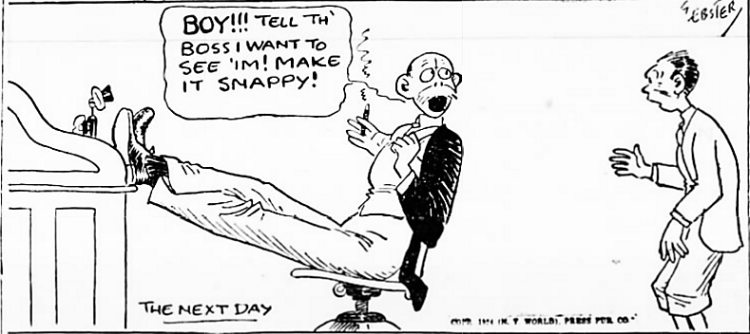
NO USE DENYING IT – I’M A FLAT FAILURE. EVERYTHING I’VE TRIED HAS FAILED! I OUGHT TO BLOW MY BRAINS OUT
POOR OL’ BOY! I FEEL SORRY FOR ’IM
YEP, I GUESS HE’S THROUGH

THAT NIGHT
TELEGRAPH OFFICE? I WANT TO SEND A WIRE TO STATION B-L-A-H, 164 BLANK ST. – YOUR CONCERT COMING OVER FINE — CASPAR MILQUETOAST
— AND HERE’S A WIRE FROM CASPAR MILQUETOAST — YOUR CONCERT COMING OVER FINE

THE NEXT DAY
BOY!!! TEL TH’ BOSS I WANT TO SEE ’IM! MAKE IT SNAPPY!
from The Timid Soul, by H. T. Webster
Oakland Tribune (Oakland, California) – 22nd October 1924
The American-English noun milquetoast denotes a timid, submissive or ineffectual person.
It is from the name of Caspar Milquetoast, a character created in 1924 by the American cartoonist Harold Tucker Webster (1885-1952) in The Timid Soul, and named after milk toast, an American-English term denoting a bland concoction of buttered toast served in a dish of warm milk, first recorded in The Young House-keeper or Thoughts on Food and Cookery (Boston, 1838), by the American physician and educator William Andrus Alcott (1798-1859).
The name Milquetoast is therefore comparable to the noun milksop, which denotes a dish of bread soaked in warm milk, given especially to infants and invalids, and, figuratively, a feeble, timid or ineffectual person, especially a man or boy who is indecisive, effeminate or lacking in courage. The figurative sense is first recorded in The Monk’s Tale, by the English poet Geoffrey Chaucer (circa 1342-1400).
Very early, Milquetoast became a generic name. In Film Stars To Spend Christmas At Home, published in the Akron Beacon Journal (Akron, Ohio) of 23rd December 1927, Howard Wolf wrote:
The publicity writers now turn out reams of copy depicting the ideal home lives of players portraying vampires and roues [= roués] on the screen.
Right now they are busily engaged in attempting to convince the world that the movie stars will observe Christmas in Hollywood just as Mr. and Mrs. Caspar Milquetoast do in Elmira, N. Y.
On 20th April 1932, the same newspaper published a letter from “a Brooklyn citizen”, containing the following:
Where can we find a solution to our problems when the people we elect do not represent us, when we are denied the right to express ourselves directly by referendums, and when our ‘Literary Digest’ polls are called worthless? And to cap the climax we are dubbed ‘Milquetoast’ for not claiming our just rights.
The Oakland Tribune (Oakland, California) of 12th June 1932 published a review of Grand Hotel, a film in which the American actor Lionel Barrymore (1878-1954) interpreted Kringelein, a meek clerk:
The Kringelein was a Mister Milquetoast. For thirty years he had accepted the insults, the long hours and the short pay of his Prussian boss.
